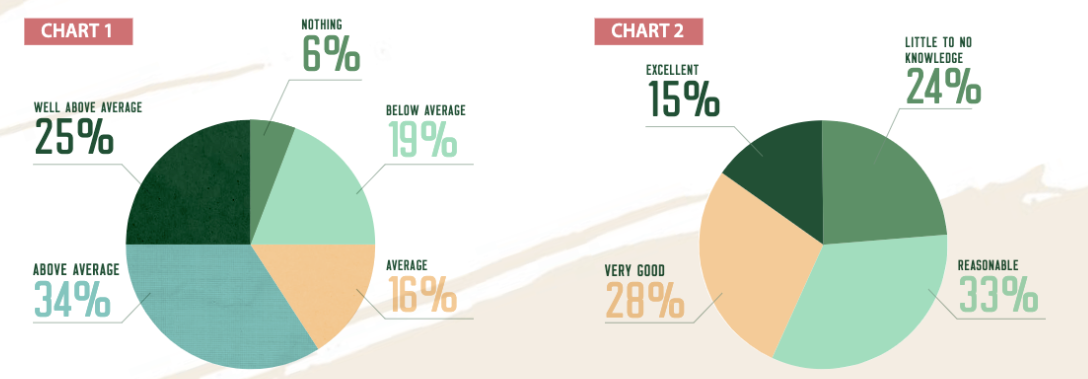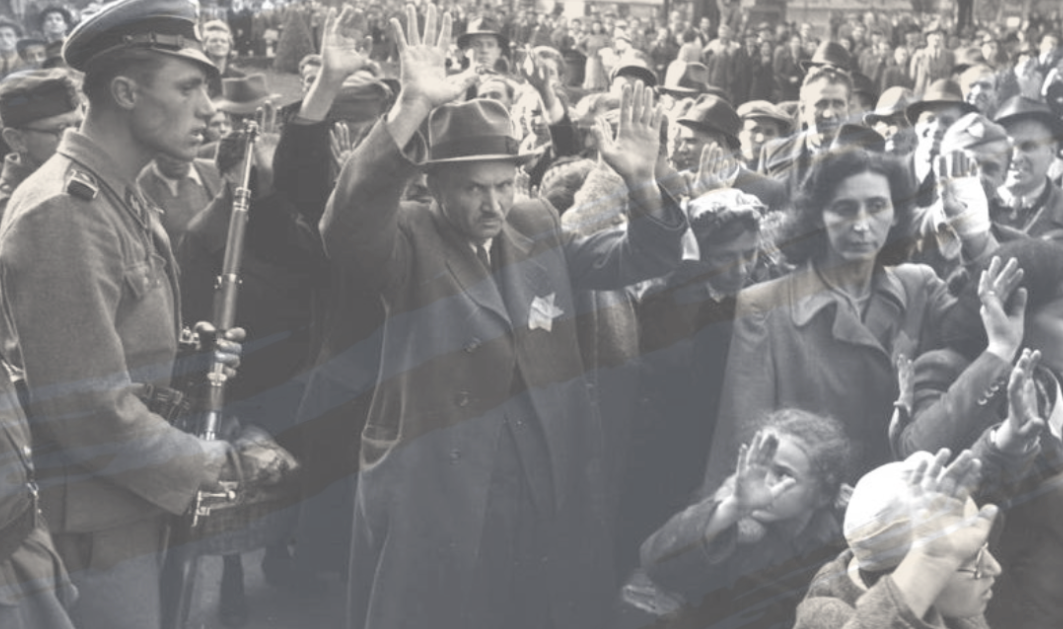How much does your non-Jewish neighbour know or care about the Holocaust?
As the foreword to the first-ever study polling Australians about the Holocaust points out, the Shoah is part of the Australian story. So it may come as a surprise that almost a quarter (24 per cent) of Australians aged 18 and over have little or no knowledge about the Holocaust and Australia’s Shoah connections.
For millennials, that lack of Shoah knowledge applies to virtually a third (30 per cent) of the demographic, but millennials are more passionate and caring about the devastation caused by the Holocaust.
Men are almost twice as likely as women to have excellent Holocaust knowledge, but women ranked higher in caring and awareness about the Holocaust.
The results of the Gandel Holocaust Awareness and Knowledge in Australia Survey will be officially released today (January 27), International Holocaust Remembrance Day (IHRD), and key findings and recommendations will be presented at tonight’s IHRD national online commemoration hosted by the Australian Holocaust Museum Alliance.
Combing through the findings, some might take heart that two-thirds of Australians support compulsory Holocaust education in schools.
The Gandel survey found Australians’ knowledge about their country’s own history where it intersects with the Holocaust is significantly lower than their general knowledge about the Holocaust, with more than 70 per cent of Australians unaware about Australia’s connections to the Holocaust.
“Very few Australians knew about William Cooper, the Dunera Boys, the Evian Conference and what the Australian government said there,” Gandel Foundation CEO Vedran Drakulic tells The AJN.
Unsurprisingly, Australians who have read Holocaust literature and survivor biographies, or have learned about the Shoah in school or by visiting a Jewish museum, possess greater awareness.
But there is overwhelming agreement among Australians (88 per cent) that “we can learn lessons for today from what happened in the Holocaust”.
Almost eight out of 10 Australians (78 per cent) believe that Holocaust museums and memorials are valuable, and two-thirds (66 per cent) believe it should be compulsory to teach about the Holocaust in schools.
The number of survivors who came to this country during and after the Second World War, the political decisions that were made, particularly relating to Jewish refugees, as well as alleged war criminals who came here after the genocide, means that the Holocaust is intimately connected with Australian history,” states the foreword of the survey report.
88 per cent of Australians agree that we can learn lessons for today from what happened in the Holocaust – to me that’s massive – Vedran Drakulic
Australia is arguably home to the highest number of Holocaust survivors per capita outside Israel. “Holocaust survivors who came to Australia have made a significant contribution to the society and have also been instrumental in keeping the message of these events relevant, with the hope of combating contemporary forms of racism, antisemitism, prejudice and hate,” the report states.
And particularly with the Australian government now recognising the importance of the Holocaust for Australian society – Australia has been accepted as a full member of the International Holocaust Remembrance Alliance (IHRA) – Holocaust commemoration, education and research are now intrinsic to Australian national values. The Australian government is committed to establishing a Memorial Day and implementing Holocaust education across Australia’s secondary school sector.
It was the right time for the Gandel Holocaust Awareness and Knowledge in Australia Survey to be launched. Drakulic describes the 2021 initiative as “the first large-scale survey of Australians’ knowledge of the Holocaust, their attitudes to Holocaust education and commemoration, their feelings towards Jews, and their perspectives on the regulation of antisemitism and hate speech”.
The survey was funded by the Gandel Foundation and undertaken by researchers from Deakin University, where academics Steven Cooke, associate professor of Cultural Heritage and Museum Studies, and Dr Donna-Lee Frieze, a research fellow, have been immersed in Holocaust studies for years and are Australian delegates to IHRA.
A set of 70 questions reached more than 3500 people, making it the largest poll of its type ever done. It adds to the knowledge gleaned overseas by polling from the Pew Centre and Claims Conference surveys in the US, the Azrielli Foundation survey in Canada which was conducted in collaboration with the Claims Conference, and Claims Conference Holocaust Knowledge and Awareness Surveys in the United Kingdom, France and Austria.
The Gandel survey spans the spectrum of demographics, “across age, education, geographic location, socio-economic background and cultural background”, explains Drakulic. The sample size of the Gandel survey is much higher than that of the US and Canadian surveys, which used a base of around 1500 respondents.

An advisory group was created to develop the questions, study the outcomes and draft the recommendations.
It includes Nina Bassat, an Australian child survivor; Richelle Budd Caplan of the International School for Holocaust Studies at Yad Vashem; Suzanne Hampel, co-president of the Jewish Holocaust Centre in Melbourne; Lauren Hovelroud, a Brisbane educator and graduate of the Gandel Holocaust Studies Program; Rebecca Kummerfeld, head of education at the Sydney Jewish Museum; MaryEllen Miller, a senior career officer at DFAT; and Peter Wertheim, co-CEO of the Executive Council of Australian Jewry.
Responses to the Gandel survey were collected throughout September last year, and the material was analysed over October and November. Interpreting the data were Cooke and Frieze, assisted by Deakin researchers Professor Andrew Singleton, professor of social knowledge and social research, and Dr Matteo Vergani, a senior lecturer in sociology.
“Not many people know about Australia’s hardline attitude towards Jewish refugees before the Second World War,” says Cooke. “How does knowing that history help us to, for instance, reflect on our attitudes towards asylum seekers today?”
Says Frieze, “People tend to see the Holocaust as a tragic European event that happened far away. If we can illuminate Australia’s connections to the Holocaust, both good and bad, it will help enhance our knowledge and understanding of genocide more generally.”
Vergani focused particularly on Holocaust awareness in the survey. Drakulic says Vergani’s brief was to dive beneath the facts and gauge Australians’ emotional awareness about the impact of the Shoah. “Knowledge is knowledge, how much you’re aware of the facts. But the survey defined ‘Holocaust awareness’ as acknowledging the true scale, and caring about Holocaust education,” argues Drakulic.
“A major goal of the study was to ascertain not just how much Australians know factually about the Holocaust as a historical event, but how aware they are of the catastrophe and its enduring impact in the present day.”
The survey found that, on average, those with comparatively higher levels of Holocaust awareness had warmer feelings towards minority or disadvantaged groups. Holocaust awareness is associated with positive attitudes towards Jews and other religious minorities, including Hindus, Muslims and Buddhists, and is also associated with greater compassion for asylum seekers and Australia’s First Nations peoples.
If we can illuminate Australia’s connections to the Holocaust, both good and bad, it will help enhance our knowledge and understanding of genocide more generally. – Dr Donna-Lee Frieze
Compared to the US findings, Australians’ familiarity with Holocaust-related facts “stacks up fairly well”, says Drakulic.
Australians’ knowledge of key historical facts about the Holocaust was generally good, with almost 70 per cent correctly identifying that the Holocaust refers to the genocide of Jews during the period 1933-45. Just over half (54 per cent) correctly identified that the number of Jews murdered was approximately six million. This compares favourably with the results of similar surveys in other parts of the world.
However, only about half of Australians knew that Adolf Hitler came to power through a democratic process, and just under half the population knew the location of Auschwitz-Birkenau.
On antisemitism, the survey found more than two-thirds of Australians (68 per cent) “agree” or “strongly agree” that Jewish people are as loyal to Australia as other Australians; there were five per cent that disagreed, and 27 per cent of respondents neither agreed nor disagreed.
The survey found only two per cent of Australians deny the Holocaust happened, but worryingly, when asked whether “the scale of the Holocaust is exaggerated”, almost a fifth of respondents neither agreed nor disagreed. And asked whether “people still talk too much about what happened in the Holocaust”, 29 per cent neither agreed nor disagreed.
Drakulic reflects that while figures for those “on the sidelines” when it comes to antisemitism and Holocaust denial are concerning, the survey revealed widespread support for Holocaust education and museums, with almost 80 per cent valuing Holocaust memorials and museums, and nearly 70 per cent supporting compulsory Holocaust education in schools.
“There are areas where we can do better,” he says, but he is upbeat that “88 per cent of Australians agree that we can learn lessons for today from what happened in the Holocaust – to me that’s massive”.
Gandel Foundation chairman John Gandel adds, “The Holocaust holds an enduring relevance for the world today. We are committed to preserving the memory of the Holocaust and to helping future generations learn about the need to protect and uphold human rights, so they can become a force for good in this world. Findings and recommendations from this kind of research can help us to achieve that goal.”
The recommendations
As a result of the survey, the Gandel Holocaust Knowledge and Awareness in Australia Survey has made a number of recommendations.
- Include the Holocaust on the curricula of Australian states and territories, and support teachers with ongoing accredited professional development;
- Develop strategies to drive engagement with Holocaust museums, memorials and educational institutions;
- Research, create, and distribute specific resources to address gaps in Holocaust knowledge, especially the period 1933-1939, and as it relates to Australia;
- Develop a research agenda to understand the long-term impact of Holocaust education in schools and museums;
- Challenge antisemitic myths and stereotypes in education through support for education programs;
- Improve communication about the need for annual commemorative activities;
- Provide opportunities for students to engage with Australian Holocaust survivor testimony; and
- Repeated cross-sectional research on Holocaust knowledge and awareness.
The full report of the Gandel Holocaust Awareness and Knowledge in Australia Survey can be accessed at gandelfoundation.org.au


comments